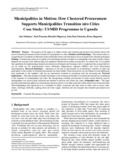| dc.description.abstract | The purpose of this paper is to define clusters and clustered procurement and critically discuss the role of clustered procurement in the evolution of municipalities to cities. Methods and Methodology– The research adopts a comprehensive consultation of literature review published sources and listening to voices of purposively selected participants. Findings –Clustered procurement is capable of contributing outwards evolution of municipalities into cities if policy makers integrate the concept in the national legal and regulatory framework for public procurement. To achieve this, it is essential that a guideline for implementing clustered procurement is developed and training on how to implement this concept before it can be rolled out for implementation across Ministries, Departments, Agencies (MDAs) and Local Government Administrations. Research limitations – Literature on the role of procurement in contributing to creation of cities and particularly in the context of clustered procurement has been limited. Some discussions that are related to joint bidding are only mentioned on the supplier’s side but not extensively reviewed in accordance with the procuring end. Practical implications – The study provides in-depth knowledge on the working and benefits of clustered procurement in contributing to the transition of municipalities into cities. By incorporating clustered procurement in urban service delivery options, municipalities can secure quality infrastructure required to become and sustain city status. Originality/value – The paper provides fresh literature updates on clustered procurement and how it can help small and middle-sized towns transit into cities while highlighting with special focus to a multitude of traffic, communal and other issues of cities such as access roads, streets, sewerage, sidewalks, lighting, food and water supply, suburban and city transport that clustered procurement can provide | en_US |

